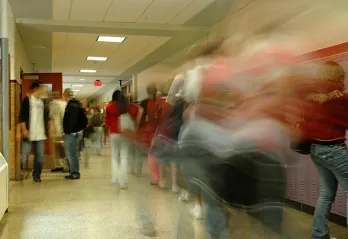Letter From The CEO: Aug 2016

This is an extremely important subject for parents: our kid’s friend group. To prep for writing this particular blog, I read a number of research articles on our current level of understanding around peer influence on our children and teens. Also, I have three kids (ages 20, 18, 13) so… I am in the midst of living this battle right now.
The results are what one would expect, but let me break it down for you and give you some recommendations that seem to be repeated throughout the literature.
Studies show that parents are the most significant influencers in a child’s life during grade school years. Then it begins to reverse in middle school, and it completely switches to outside-the-home influencers by high school. There are always exceptions to a rule, so please realize I am just talking in generalizations.
This means that you as a parent set the foundation for your kids and then hope that the foundation is strong enough to withstand whatever hits it. As a YMCA director, I have seen again and again kids who went off the rails but turned it around later because they had a strong foundation that centered them.
A number of longitudinal studies (studies that follow the subjects for a long period of time) have shown that in the teen years, friends influence behaviors around drinking, sex, GPA, religion, music, dress, sports and, the biggie, drug use. Even kids with a very strong foundation can be influenced by their friends to try drugs. We have all witnessed groups of kids dressing similarly or listening to the same types of music. That’s why it is a cliché to see high schools divided into groups: jocks, theater kids, mathletes, emos, druggies, church kids, preppies, the sharks and the jets, etc. This becomes something that we joke about as we get older, but it is all about peer influence for good or bad.
Let us as parents accept the fact that peer influence is a real thing and realize it is a power that we can harness for good or for bad. Here's how:
Every Step They Take
The first and most important thing is to ensure that you are dialed into your teen’s life as much as possible. They will never tell you everything. They are young adults and have their own lives, and they want those lives kept private. So you have to infiltrate them. The Find My iPhone app will show you where they are. Were they honest with you about what they are doing? Never throw it in their face that you are tracking them—but track them. Let them know that you are observing their movements. They won't like it, but they will forget that you can see what is going on. Also, it is a safety tool: If they drive off the road and are incapacitated at 2am, you have a chance of finding them quickly.
Parenting in the Digital & Real Worlds
Number two: Your kids must friend you on all social media that they use. You pay for it, you get to see what they are up to. Don’t comment on their social media; you are not in their friend group, just monitor it. Have their friends over, get to know who their friends are and if they are a good influence.
If their friends are not a good influence, then you must force a change. Remember, you are the parent and some battles are worth it. Pick those battles, be careful what you choose to fight about — but absolutely pick the friend battle. Even if you have to change their schools, it may be worth it under extreme circumstances.
Here is a codicil to that. My oldest son had a friend who I thought was a bad influence. I thought he was into drugs. It turns out that I was wrong. His friend was actually incredibly opposed to drugs and was a main influencer on staying away from them. I judged a book by its cover.
With teens, we must be ultra careful in what we say. The teen sense of black and white is so strong that they will discount what we say if we have our facts wrong. Take the time to understand their friends and what the influence is.
Become Their Home Base
Number three: Have the friend group hang out at your house on a semi-regular basis. If your kid asks if they can have friends over, try to never say no. This is a great opportunity to get to know their friends. Have food on hand (they eat like animals, and three of them can consume a metric-ton of pizza, chips and cola. It is amazing to watch, not even Steve Irwin would have gotten between a teenager and a pizza). If you want to figure out how to attract kids to your house, ask your teen. Is it a good TV-and-Xbox combo? A hot tub? Food? Having a good backyard? What is it that will appeal to them? Once they are there, be around, pop in with food refills and just talk to a different kid for a few minutes so you can size them up.
Here’s a shocking fact: Kids want to talk to other adults who are not their parents. It is weird but true.
Tasks and Checklists
Number four: Have checklists and chores for them. Your kids are not you, and they do not see what needs to be done. Also, most teens have their own lives. If you do everything for them, why do they need to do anything? They figure that you always took out the trash, did their laundry, picked up their room and cleaned the house, so why wouldn’t you continue to do so? The more you do, the less self-reliant they will be.
Remember, teens do not have great executive function in their brains. Their impulse control is low, and they do not have enough time on the planet to understand the consequences of their actions. So be patient, be tolerant, count to 10 a lot.
You counteract all this by teaching them. Do they know how to drive defensively? Do they know how to change a flat tire? Do they know how to call the help line for the cable company? Do they actually know how to do laundry and vacuum and dust? Did they do their own taxes? The point is that we make so many assumptions about what they know and don’t know, or we facilitate their dependence on us.
What does this have to do with peer influence? It helps set baselines for behavior expectations. It is also a part of being authoritative. For example, their ideas of clean and when a job is finished are completely different than ours. Show them and hold them to your standard. If they fail to meet the standard, don’t yell. Just send them back to do it again. This lesson translates into all sorts of life lessons. If you can get them to do chores properly then you will have a better time in getting them to do their homework properly. Also, if they exercise control over their environment at home successfully then they can exercise control over their environment with their friends.
Be The Boss
Number five: Be their parent, not their buddy.
Another significant longitudinal study shows that a mitigating factor of peer influence for GPA and drug use was authoritative parenting. This means you are still the boss, and acting like that helps reduce the negative peer influence.
You should have a great relationship with your kids, but ultimately you do know best. If things do go south, then act hard and fast. It’s OK to drug test your kid if you have reason to believe that they are going in a bad direction. It’s OK to change schools. It’s OK to ban your kid from seeing certain kids.
Most importantly, get help from other adults and professionals who can assist. School counselors or professional therapists can give you perspective on behavior. Is this just normal experimentation? Does it require a family chat? Or is this a deeper issue?
As a team, you can decide how big of a deal to make it. Appropriate reactions are important. Remember, for a teen everything is amplified. My friend’s daughter didn’t make the dance team, and she said it was the end of her life and refused to go to school. At the time it was huge for her, but her parents swept her out of the house on Monday to school and somehow she survived it. Now she laughs about her reaction.
My point is that we have to be aware that they don’t have much perspective, and we must provide that and put other significant adults, who will do that as well, into their lives.
In conclusion, our kids physically exhaust us until they are in sixth grade because we are doing physical work with them. From middle school on, our kids are mentally and emotionally exhausting. It changes from physical combat to psychological combat and as parents we need to adjust our battle plans accordingly.
We must win these battles, so our kids can win the war.
Thank You,
Chris Coker
CEO/President of YMCA of Boluder Valley

